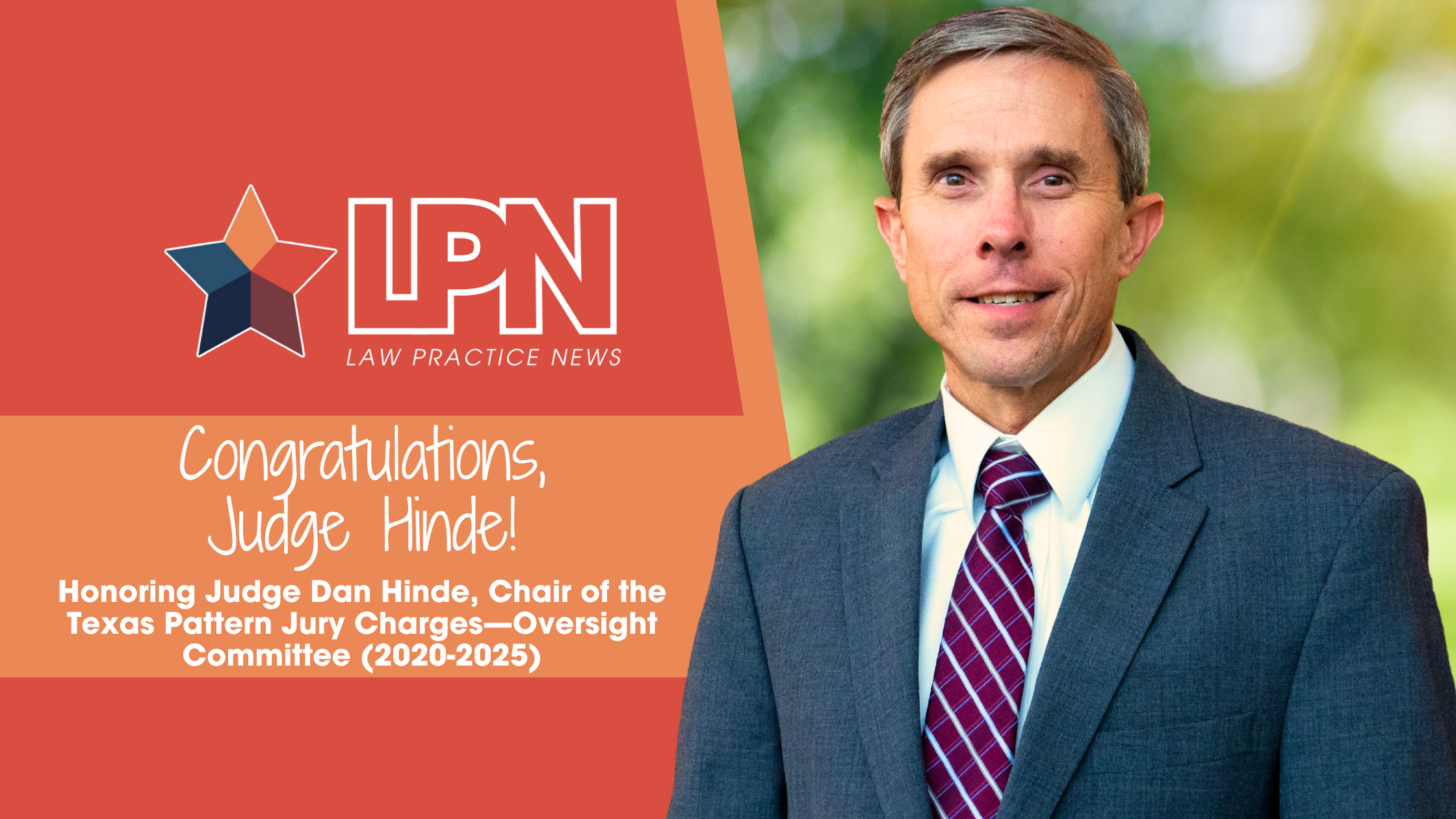Judge Dan Hinde Ends Term as Chair of Texas Pattern Jury Charges — Oversight Committee
Published on August 11, 2025 Law Practice News

This year, Judge Dan Hinde will end his term as chair of the Texas Pattern Jury Charges — Oversight Committee. Judge Hinde has been a member of the Oversight Committee for over a decade. He served as chair of the committee for the past five years.
In his role as chair, Judge Hinde facilitated updates on multiple volumes, often working with the drafting committees to resolve conflicting points of view and leading working groups to draft updates on significant updates impacting more than one volume. While Chair, Judge Hinde often presented to attorney groups on the pattern jury charges and the work of the committee, educating practitioners and the bench on the charges and how they could be used in their work and practice.
Incoming Chair LaDawn Nandrasy expressed her “heartfelt thanks to Judge Hinde for his many years of hard work and outstanding leadership of the Oversight Committee.” She noted that in his time as Chair Judge Hinde “focused the Committee on maintaining a careful balance in providing oversight to the substantive volumes while also giving deference to their subject matter expertise,” adding “I’m grateful for his guidance and vision and hope to build on his excellent work.”
Congratulations, Judge Hinde! Your impact on the state's legal field cannot be overstated. The Bar honors your commitment and dedication.
We had the honor of hearing Judge Hinde’s insights on the Pattern Jury Charges based on his years of service on the committee. Find his answers below.
Question: How have these publications served you as both a practitioner and a judge?
Judge Hinde's Answer
The PJCs provide an essential resource for lawyers and judges as they compile jury charges in their cases. They are a ready reference guide and starting point for considering how to instruct and charge the juries in their cases. They highlight the typical way courts can charge the jury, while flagging issues and major precedents for further consideration.
On a more fundamental level, they provide a wealth of examples on how to draft questions, definitions, and instructions. Judges and practitioners will have cases where there is no PJC for a particular issue, claim, or defense. But the PJCs provide a wealth of examples for how to phrase a broad-form question, how to draft a definition, and how to word an instruction, as well as how to format them in a consistent, understandable way for juries.
Question: Why do you believe these charges/this publication is essential to the legal industry/application of the law?
Judge Hinde's Answer
First, every county and state judge and appellate justice are given free access to the PJCs. They are a part of the core references that the judges have at their disposal. So, it is essential for practitioners to have them, too, so that they have access to and are familiar with the references that most judges will use in compiling a jury charge.
But the usefulness of the PJCs does not start at trial when preparing and arguing the jury charge. They are a great resource for counsel at the beginning of a case and during pretrial work up. For instance, at the beginning of the case many lawyers use them to put together an initial pro forma jury charge based on the pleadings, which they can then use to better focus areas of discovery and pretrial work up.
Additionally, the PJCs are great finding tools and secondary references for brainstorming potential issues, claims, and defenses based on the facts of the case. The comments usually flag some of the key cases on the claims, defenses, instructions, or definitions under discussion. Practitioners can then review and research those key cases to see how the authority has developed and gain greater in-depth understanding.
 Judge Dan Hinde and Elma Garcia, Assistant Director of Texas Bar Books
Judge Dan Hinde and Elma Garcia, Assistant Director of Texas Bar Books
 Judge Dan Hinde at the Texas Law Center
Judge Dan Hinde at the Texas Law Center
 Judge Dan Hinde at the Texas Law Center
Judge Dan Hinde at the Texas Law Center
.png)
Texas Bar Practice
Texas Bar Practice works with the most experienced and knowledgeable judges and attorneys to prepare and edit books, practice manuals, and legal forms to help lawyers and judges better serve the public with professional, accurate, and timely information.